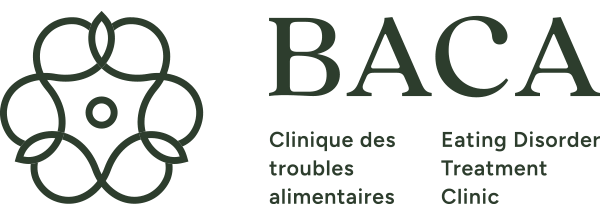Bulimia
Bulimia
Bulimia
Demystifying bulimia nervosa
Bulimic behaviour takes place in secret. This isolation helps to perpetuate the destructive bulimic cycle. People with this disorder are typically of normal weight or overweight. Many individuals suffering from bulimia have histories of chronic restrictive dieting.
Bulimia symptoms
A. Recurrence of binge eating
Bulimia has the following two characteristics:
1) Ingestion, in a limited period of time (ex.: less than two hours) of a quantity of food far greater than the amount most people would ingest in a similar period of time and in the same circumstances.
2) Feeling a loss of control over eating behaviour during the episode (ex.: feeling unable to control what you eat or the quantity you eat).
B. Recurrent inappropriate compensatory behaviour aimed at preventing weight gain, such as: induced vomiting, misuse of laxatives, diuretics, enemas or other medications; fasting; excessive physical exercise.
C. Binge eating and inappropriate compensatory behaviours both occur, on average, at least once a week over a three-month period.
D. Self-esteem is excessively influenced by weight and body shape.
E. The problem does not occur exclusively during episodes of anorexia nervosa.
Do you think you might be suffering from bulimia?
Do you know someone close to you who might be suffering?
Specialized treatment for adolescents
More and more adolescents are vulnerable to eating disorders during this complex stage of development.
Outpatient follow-ups for adults
Woman, men, athletes… A different approach is necessary for the different populations in our society. Individual needs will vary and the experts at the BACA Clinic are known to adjust their approach accordingly.
– Marie
– Catherine’s parents
– Micheline
BACA
Eating Disorders Clinic
Come and meet us
2121 Crescent street, suite 200
Montreal (Quebec) H3G 2C1
Canada!
Contact us
Phone: (514) 544-2323 | 1-833-544-2323
Fax: (438) 802-5814
Email: info@cliniquebaca.com



